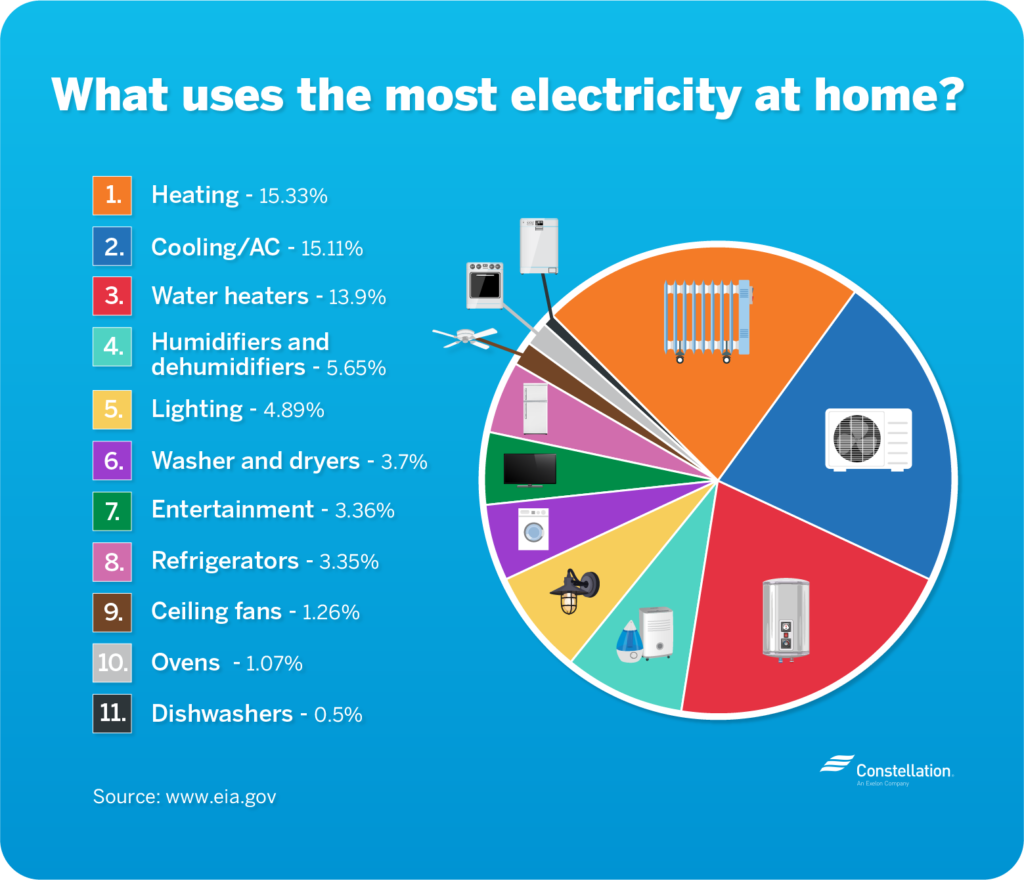What uses a lot of electricity?

Have you ever wondered what uses a lot of electricity in your home? Understanding which appliances consume the most energy can help you make informed decisions about your energy usage and potentially save money on your utility bills. In this article, we will uncover the top energy-guzzling appliances and provide insights into how you can minimize their electricity consumption.
- The Top Energy-Guzzling Appliances
- 1. Air Conditioners
- 2. Electric Heaters
- 3. Refrigerators and Freezers
- 4. Washing Machines and Dryers
- 5. Electric Ovens and Stoves
- 6. Computers and Gaming Consoles
- 7. Televisions
- 8. Water Heaters
- 9. Pool Pumps
- 10. Electric Vehicles
- Conclusion
- Frequently Asked Questions
The Top Energy-Guzzling Appliances
While every household has its unique set of appliances, certain devices tend to be notorious for their high energy consumption. Let's take a closer look at the top culprits:
1. Air Conditioners
Air conditioners are known for their ability to keep us cool during hot summer months. However, they also consume a significant amount of electricity. To reduce their energy usage, consider using programmable thermostats, maintaining proper insulation, and regularly cleaning or replacing the air filters.
2. Electric Heaters
Electric heaters are commonly used to warm up spaces during chilly winters. Unfortunately, they can be energy vampires. To save energy, consider using space heaters only when necessary and ensure proper insulation in your home.
3. Refrigerators and Freezers
Refrigerators and freezers are essential for keeping our food fresh. However, they run 24/7, making them one of the biggest consumers of electricity in a household. To minimize their energy usage, keep them well-maintained, avoid leaving the doors open for extended periods, and regularly defrost if necessary.
4. Washing Machines and Dryers
Washing machines and dryers make our laundry chores easier, but they also consume a significant amount of energy. Opt for energy-efficient models, wash with cold water whenever possible, and line dry your clothes to save on electricity.
5. Electric Ovens and Stoves
Cooking appliances like electric ovens and stoves can quickly gobble up energy. To reduce their electricity consumption, use the appropriate burner size, match the pot size to the burner, and utilize lids to retain heat.
6. Computers and Gaming Consoles
In today's digital age, computers and gaming consoles have become household staples. While they provide entertainment and productivity, they can also be energy-intensive. Remember to turn off these devices when not in use and enable power-saving settings.
7. Televisions
Televisions are a common source of entertainment for many households. However, they tend to consume a significant amount of electricity, especially if left on for long periods. Consider adjusting the brightness settings and powering off the TV when not actively watching.
8. Water Heaters
Water heaters play a crucial role in providing hot water for various household activities. However, they can consume a substantial amount of energy. Lowering the temperature setting, insulating the water heater, and taking shorter showers can help reduce their energy usage.
9. Pool Pumps
If you have a pool, you may be familiar with the energy-hungry nature of pool pumps. Consider running the pump for fewer hours, cleaning the pool regularly to minimize debris, and using a pool cover to reduce evaporation and heat loss.
10. Electric Vehicles
Electric vehicles (EVs) are becoming increasingly popular as a sustainable transportation option. While EVs offer environmental benefits, they do require a substantial amount of electricity to charge. To offset their energy consumption, consider utilizing renewable energy sources or charging during off-peak hours.
Conclusion
Being aware of the energy consumption of various appliances can empower you to make conscious choices that reduce your environmental impact and save on electricity costs. By implementing energy-saving practices and using energy-efficient alternatives, you can contribute to a more sustainable future.
Frequently Asked Questions
1. How can I reduce the energy consumption of these appliances?
To reduce energy consumption, consider using energy-efficient appliances, practicing proper maintenance, utilizing power-saving settings, and being mindful of your usage patterns.
2. Are there any energy-efficient alternatives to these appliances?
Yes, there are energy-efficient alternatives available for many appliances, such as energy-efficient air conditioners, refrigerators, washing machines, and more. Look for appliances with the ENERGY STAR label, indicating their energy-efficient features.
3. Can using smart home technology help in minimizing electricity usage?
Yes, smart home technology can be beneficial in managing and minimizing electricity usage. With features like remote control, energy monitoring, and automated settings, you can optimize energy consumption in your home.
4. What are some other common energy-wasting habits to be aware of?
Some common energy-wasting habits include leaving lights and electronics on when not in use, using outdated appliances with low energy efficiency ratings, and neglecting to unplug devices that continue to draw power even when turned off.

Leave a Reply